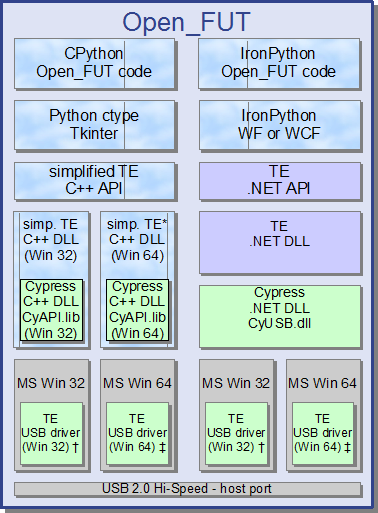Page History
Generation 2 and generation 3 technology stacks are very similar at the application layer. Porting an application from generation 2 to generation 3 technology stack in quite easy and well documented in user friendly porting guides.
Generation 2
Users can write their application code in C/C++ using the DEWESoft TE USB API. The application code shall use handles.
Sample application projects:
Generation 3
Users can write their application code
- in C/C++ using the TE_USB_FX2_CyAPI APIs or
- in a language of the .NET Framework (Visual Basic, Managed C++, C#, ...) using the TE_USB_FX2_CyUSB API.
The application code does not use handles.
If the user wants to develop and launch an application or system service (e.g. a Plug and Play application or system service), he/she can call any useful functions or methods from CyAPI (in C++ only), TE_USB_FX2_CyAPI (in C++ only), CyUSB (in any .NET programming language) or TE_USB_FX2_CyUSB (in any .NET programming language).
TE_USB_FX2_CyAPI.dll (C++)
Documentation:
- C++ TE_USB_FX2 API reference manual (UM-TE_USB_API.cpp Reference Manual)
- DEWESoft C++ DLL to Trenz Electronic C++ DLL Porting Guide (UM-TE_USB_API.cpp Porting Guide)
Application code examples:
- C++ software projects templates and reference applications are available here.
Compiling C++ applications:
- Users can write their own C++ applications by including the FilesToImportForApplicationCpp.zip package.
- C++ application code can access CyAPI.lib classes and functions directly to extend TE_USB_FX2_CyAPI APIs.
- C++ applications using Qt can be easily compiled with Microsoft Visual Studio 2010 Professional and the Qt Visual Studio Add-in on QtProject.org.
- There is no difference between compiling C++ applications for 32 bit Windows operating systems with Microsoft Visual Studio Express and Microsoft Visual Studio Professional.
There is some difference between compiling C++ applications for 64 bit Windows operating systems with Microsoft Visual Studio Express and Microsoft Visual Studio Professional. Such differences are explained in the C++ TE_USB_FX2 API reference manual (here). C++ applications for 64 bit Windows operating systems with Microsoft Visual Studio Express requires also Microsoft Windows SDK 7.1
Note The staightforward procedure to install both Microsoft Windows SDK 7.1 and Microsoft Visual Studio 2010 Express on the same computer will fails: see here. In this link, 2 different procedure are described; we have sucessfully tested both procedures.
TE_USB_FX2_CyUSB.dll (C#)
Documentation:
- C# TE_USB_FX2 API reference manual (UM-TE_USB_API.cs Reference Manual)
- DEWESoft C++ DLL to Trenz Electronic C# DLL Porting Guide (UM-TE_USB_API.cs PortingGuide)
Apllication code examples:
- .NET software projects templates and reference applications are available here.
Compiling C# applications:
- Users can write their own .NET applications by including the FilesToImportForApplicationCsharp.zip package.
- .NET application code can access CyUSB.dll classes and methods directly to extend TE_USB_FX2_CyUSB API.
Simplified TE_USB_FX2_CyAPI.dll (C++)
Documentation:
Apllication code examples:
- Open_FUT (generation 3)
Compiling C++ applications:
- Pure extern C code library simplified version of TE_USB_FX2_CyAPI (C++) APIs.
- Ease binding to/from Python (ctype) or another programming language
- Impossible to directly access CyAPI.lib classes and functions to extend Trenz Electronic TE_USB_FX2_CyAPI.dll libraries
- It is not thread safe
Open_FUT (generation 3)
Open_FUT (generation 3) has been developed in CPython by using a pure extern C code library version of TE_USB_FX2_CyAPI APIs (codename: simplified TE_USB_FX2_CyAPI APIs).
Open_FUT could be ported to .NET by
- using TE_USB_FX2_CyUSB library instead of the simplified TE_USB_FX2_CyAPI library;
- using .NET Trenz Electronic USB FX2 API instead of the simplified C/C++ Trenz Electronic USB FX2 APIs;
- using Microsoft WF (Windows Forms) or Microsoft WCF (Windows Communication Foundation) instead of Tkinter (Tkinter is not well supported by .NET);
- using IronPython (or Python for .NET package) instead of Python ctype with CPython.
| Scroll pdf title | ||
|---|---|---|
| ||
